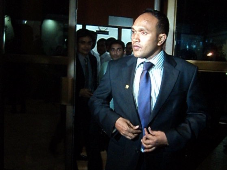The Civil Court has ruled that a decision by the Maldives Police Service to cease cooperating with opposition-aligned TV station Raajje TV was unconstitutional.
Police announced in July that they had stopped cooperating with the local broadcaster, alleging that the station was broadcasting false and slanderous content about the police which had undermined its credibility and public confidence. Raajje TV subsequently filed a suit in the civil court challenging the legality of the decision and requested the court to order police take back their decision.
Delivering the verdict, Civil Court Judge Mariyam Nihayath said the court was of the view that the police decision had been to completely suspend cooperation with the TV station, rather than just barring the channel from specific events and functions.
The judge added that the court believed such a decision was “extremely dangerous and significantly serious” and could result in “chaos and infringement of social harmony.”
Dismissing the police argument that it had the sole discretion to decide who to invite to press conferences and functions, the court stated that the action more resembled a deliberate attempt to limit the constitutional rights of freedom of expression, freedom of media and the right to information.
“Therefore, the court finds the decision by the Maldives Police Service to not to cooperate with Raajje TV a violation of the constitution of the Maldives and the Maldives Police Services Act, and orders the Maldives Police Service to provide protection for the employees and property of the station, and to not discriminate against the TV station when providing information,” read the verdict.
Following the decision, police media official Superintendent Hassan Haneef told Minivan News that police would fully respect the court’s decision.
He further said that a police legal team would be reviewing the judgement and if the need arose, would appeal the decision in the High Court.
“We will come to a decision very soon. We will also be seeking advice from the attorney general and then seek a final decision on whether to appeal the case,” he said.
Meanwhile, Deputy CEO of Raajje TV Yamin Rasheed told the media that the judgement was a “huge achievement” for both the station and those working in the media.
“Raajje TV single-handedly stood up against the decision without support from any authority or organisation. We knew the police decision was wrong and that is why we filed the case. I believe this is a huge achievement for both Raajje TV and the media of the country,” he said.
Following the decision last year, police issued a statement claiming the channel had “deliberately and continuously broadcast false and baseless content with the intention to incite hatred [towards police].”
“Raajje TV’s broadcasting of false and baseless content about the police institution is seen to be carried out for the political benefit of certain parties and such actions neither fit with the norms of professional journalism or the principles followed by media outlets of other democratic countries,” read the statement.
The decision came just a day after Raajje TV broadcast CCTV footage of several police officers, whom the station alleged were “caught on video” while attempting to steal petrol from a motorbike parked in an alley in Male’.
Police later denied the allegations and condemned Raajje TV for spreading “false and untrue” information about them.
Superintendent of Police Abdulla Navaz in a press briefing at the time stated that the video footage was showing police carrying out their legal duty.
Raajje TV had twisted the details and information in their news report, Navaz alleged, claiming that police were confiscating a five litre container of petrol rather than stealing it.
Following the broadcast of the video, the Maldives Broadcasting Commission (MBC) sent a letter to the TV station accusing it of broadcasting the content without checking its authenticity and ordered it to apologise for its actions.
However, speaking to Minivan News at the time, Yamin confirmed the incident took place and said the station would stand by its broadcast.
Raajje TV is one of the five private broadcasters in the country and is the only television station aligned with the opposition Maldivian Democratic Party (MDP). The TV station has come under substantial pressure and criticism from groups including the government and political parties aligned with it. The station has also claimed to have faced outright sabotage.
 (0)Dislikes
(0)Dislikes (0)
(0)